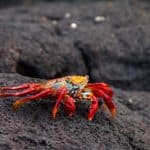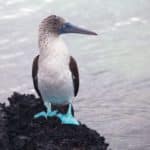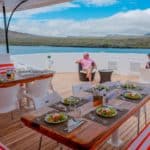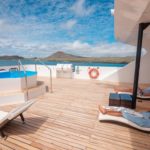Classic Galapagos: Central Eastern Islands (Grand Queen Beatriz)
Experience the serenity of the Galapagos Islands as you drift across the Pacific Ocean on this 10-day adventure cruise through the central eastern islands. Retrace the voyage of Charles Darwin by sea, admiring the sandy beaches of Espumilla contrasted with the jagged rock formations and volcanic craters of Isla Santiago. Look out at the ocean, land and sky, spotting blue-footed boobies, sea turtles and sea lions in their natural habitat. Go hiking and snorkelling each day and learn about the geology of these lands from your handy naturalist guide, all the while spotting some pretty incredible and varied wildlife.
10 days, from
$8,205
per person
GROUP SIZE
ACTIVITY LEVEL
Details
Countries Visited:
Ecuador
Accommodation: Hotel (2 nights), Overnight boat (7 nights)
Transportation: Minibus , Boat , Plane , Zodiac
Included Meals:
- 9 breakfasts
- 7 lunches
- 8 dinners
Group size: Minimum 1, Max 16
Minimum Age: 12
Get a true taste of the Galapagos, sailing through its central and eastern islands, discovering untouched wilderness and unique wildlife.
Enjoy a room with a new view each day, getting to each island in the comfort of the mighty M/Y Grand Queen Beatriz.
Encounter giant Galapagos tortoises, blue-footed and masked boobies, pelicans and frigate birds, as well as land and marine iguanas, sea lions, fur seals and perhaps dolphins, whales and sea turtles.
Live on island time, with the opportunity to explore coves, craters and inlets off the beaten track – one of the many benefits of a small group sail.
Experience the contrasting landscapes of a selection of islands. From the sandy Espumilla beach to the volcanic formation of Pinnacle Rock, you’ll see the diversity of the Galapagos.
Itinerary
On arrival at Quito's Mariscal Sucre International Airport you will be met and transferred to your hotel. The remainder of the day will be at your leisure.
A welcome meeting will be held in the evening at either 5 pm or 6 pm when you meet others travelling with you on your sail to the Galapagos Islands. As today is an arrival day, you can arrive at any time as there are no activities planned until this meeting.
Quito sits at high altitude under the towering Pichincha volcano. It is a beautiful city, arguably one of the most beautiful in South America. The city stretches along the valley and is surrounded by the Andes. The Old Town of Quito is awash with history, with more than 30 churches to explore, and a number of fascinating museums. La Compania de Jesus is considered to be the most beautiful and ornate churches in the Americas. The city's oldest street, Calle La Ronda, is well worth exploring.
As this trip spends very little time in Quito, we recommend you spend a few extra days before or after your trip to experience all the city has to offer. You may even wish to explore further beyond the city and visit Otavalo, Cotopaxi, the Cloud Forest or the Equatorial Monument.
This morning you will be transferred to the airport for your flight to the Galapagos Islands. Please note the pick-up time can be as early as 4.30 am (a boxed breakfast will be provided), as the airport is a 1-hour drive away and you must allow for delays and check-in times. (Your tour leader will confirm this time with you at the welcome meeting).
The flight to the Galapagos will make one stop in Guayaquil to pick up other passengers. (Total flight time is about 3.5 hours).
You will be met in the arrival hall of the airport by the National Park Guide, and transferred to your boat, the M/Y Grand Queen Beatriz – a first-class boat with all of the creature comforts you’ll need.
This afternoon you will travel into the interior of Isla San Cristobal to visit the highlands site of ‘Galapaguera of Cerro Colorado’ (Red Hill) where the national park has established a breeding program and information centre for native tortoises. Here, we will be able to see giant tortoises in their natural habitat and learn all about their origin, evolution and their threatened future.
Estimated travel time/distance:
Isla San Cristobal (Puerto Baquerizo) to Isla Bartolome: 8 hours (70 nautical miles)
Having cruised overnight, arrive at Bartolome – one of the most spectacular volcanic landscapes in the Galapagos, full of parasitic cones, lava flows, and home to Galapagos penguins and lava lizards.
Bartolome is a relatively new island in the archipelago and traces of its volcanic past can be seen everywhere, as seen by the amazing lunar-like landscape. The Pinnacle Rock is one of the most photographed sites in the Galapagos – a rock structure protruding from the earth like a tooth, providing a focal point for two nearby bays.
Head to nearby Isla Santiago, where you can hike to the top of a once-active volcano (360 wooden steps) and enjoy superb views across to Sullivan Bay. If you’re in luck, you might catch a glance of the Galapagos Hawk. You also have the opportunity to go snorkelling with plenty of tropical fish, starfish, white-tipped reef sharks, rays and (hopefully) penguins.
On Santiago's eastern coast sits James Island. Here, take a walk on Pahoe-Hoe lava, from an eruption that occurred in 1897, and witness the regrowth of unique plant species since the last eruption. Look out for marine iguanas, Sally Lightfoot crabs, sea lions, finches, turtles, sharks and penguins. On a walk, your guide will explain the interesting geological history of the islands.
Estimated travel time/distance:
Bartolome to Isla Santiago (Sullivan Bay): 0.5 hours (1 nautical mile)
Isla Santiago (Sullivan Bay) to Espumilla Beach: 3 hours (25 nautical miles)
Start the morning at Espumilla Beach, on the northern coast of Santiago in James Bay – one of the most idyllic locations in the Galapagos. With large waves, it is often a favourite among travellers who are beach lovers, and is also an important nesting site for marine turtles.
Look around and see Galapagos hawks, ghost crabs, blue-footed boobies (often plunging for fish) and brown pelicans up close. Espumilla is also well known for its forest of palo santo trees and some extraordinary lava formations.
You will also visit Caleta Bucanero (Buccaneer Cove), a natural monument of rocks caused by sea erosion. This cove was used by pirates to careen their ships. It is a place of local legends and stories, including where Charles Darwin camped for nine days while making his study of the islands and their wildlife. If conditions are favourable, you can enjoy some further snorkelling.
Next stop, Puerto Egas: a black sand beach located on the west side of James Bay and northwest of Santiago. South of the beach is Sugarloaf Volcano, which has deposits of volcanic tuff. This site is named Puerto Egas, after Hector Egas who last attempted to mine salt here. On the walk along the beach, you’ll encounter hundreds of marine iguanas and Galapagos sea lions. You will also see amazing tidal pools formed from ancient lava flow and home to sponges, snails, hermit crabs, barnacles and fish. Snorkelling with the seals always offers the possibility of thrilling encounters.
Estimated travel time/distance:
Espumilla Beach to Buccaneer Cove: 0.5 hours (1 nautical mile)
Buccaneer Cove to Puerto Egas: 0.5 hours (1 nautical mile)
Puerto Egas to Puerto Ayora: 7 hours (60 nautical miles)
Today you will visit Isla Santa Cruz, the second largest island in the Galapagos.
The small town of Puerto Ayora is the economic centre of the archipelago, and home to the Charles Darwin Research Station. As well as undertaking vital conservation work, the station also makes for interesting exploration and offers the best opportunities for close encounters with giant tortoises. You will also see baby tortoises and land iguanas.
Afterwards, head up into the highlands for a total change of scenery. Beginning at the coast you'll travel across Santa Cruz through the agricultural region and into the misty forests – the journey taking about 45 minutes. This is a lush humid zone containing miconia bushes, scalesia and inactive volcanic cones. Santa Cruz has more endemic plants than any of the other islands. Plus, you are likely to see Galapagos giant tortoises in their natural habitat, and perhaps even the bright red feathers of a vermillion flycatcher!
Estimated travel time/distance:
Puerto Ayora to the Highlands: 45 mins by bus
Puerto Ayora to Santa Fe: 2 hours (16 nautical miles)
Take a morning excursion to North Seymour, which is one of the most visited islands in the Galapagos. The trail on North Seymour crosses inland through the island and then explores the rocky coast. Along the way, the trail passes colonies of blue footed boobies and frigate birds.
The magnificent frigate bird, a large black bird with a long wingspan and a hooked beak, is extremely fast and has excellent vision. Frigate birds are known for the large red pouch on their necks. During mating season, the males throw back their heads, inflate the pouch (sometimes to the size of a soccer ball), and shake – trying to capture the attention of female frigates. Boobies and frigates have an interesting relationship. Sharing the same nesting area on North Seymour, blue-footed boobies nest on the ground making their nests from the twigs of the palo santos trees, while the frigate birds nest just above them in the saltbushes.
Your walk is followed by snorkelling where you will discover a colourful variety of fish and, possibly, some white-tipped reef sharks, rays and sea lions.
After lunch, visit the small sandy island of Mosquera: a relaxing stop situated between Baltra and North Seymour. Along the rocks and in the tide pool, Sally Lightfoot crabs (red lava crabs) scamper back and forth, skipping across small pools of water in search of food. These crabs with their bright red shell tops and blue under shells are stunning against the black lava. The island also has a very large colony of sea lions as well as a sizeable resident brown pelican population. Depending on the tides and visibility, you may have a chance to go snorkelling here.
Estimated travel time/distance:
North Seymour to Baltra: 4 hours (35 nautical miles)
Baltra to Caleta Tortuga: 1 hour (7 nautical miles)
Today you will take a panga (Zodiac boat) to Caleta Tortuga Negra (Black Turtle Cove) – a red mangrove wetland on the north shore of Isla Santa Cruz. Paddle among the cove’s peaceful waters, for your first taste of the underwater riches of this region – it’s a wonderful place to see green turtle and is a nursery for golden cow-nose rays, eagle rays and Galapagos sharks. There is also abundant birdlife, such as the yellow warblers and lava herons. This is also a breeding area for turtles, so it is not uncommon to see them mating.
In the afternoon, cruise over for a walk on Cerro Dragón (Dragon Hill) this afternoon - one of the best places to see land iguanas in the islands. From our dry landing we walk to a brackish lagoon frequented by lagoon birds including stilts, pintail ducks, sandpipers, sanderlings and occasionally flamingos. Further inland, the trail offers a beautiful view of the bay and the western area of the archipelago. This area is a nesting site for land iguanas, which is constantly monitored and assisted by the Charles Darwin Research Station. The arid-zone vegetation makes for an ideal location for birdwatching with Darwin's finches, Galapagos mockingbirds, the endemic Galapagos flycatcher and yellow warblers all regulars here. The path can be challenging but it will be worth it with a spectacular view of the bay!
Estimated travel time/distance:
Caleta Tortuga Negra to Cerro Dragon: 2 hours (12 nautical miles)
Cerro Dragon to Sombrero Chino (Chinese hat): 1.5 hours (9 nautical miles)
Sombrero Chino is a small islet located near the south-east coast of Santiago. It's shaped like a Chinese hat (Sombrero Chino) when seen from afar, and is geologically fascinating, with many lava tubes leading from the cone to the coast. We approach Sombrero Chino via a beautiful crescent-shaped, sandy beach that is home to sea lions and Sally Lightfoot crabs. Keep a look out for Galapagos penguins on the rocky shoreline of nearby Santiago, opposite Sombrero Chino. Follow a trail that circles the cove and passes through colonies of sea lions marine iguanas. The cove also offers some great snorkelling opportunities, hopefully with sightings of some penguins and sharks.
On to Isla Rabida, also known as Jervis Island, which is a tiny island sitting roughly five kilometres south of Santiago, having one of the most striking of the archipelago. Introduced species were eradicated in 1971, meaning that the native wildlife has now been returned to a state of isolation. Additionally, volcanic activity here has produced a vivid spectrum of colours, not least the red sand beaches and scarlet cliffs.
From the shore, the trail leads through to what is one of the finest lagoons in the Galapagos for viewing flamingos. Rabida is also a wonderful place to spot nesting pelicans. Elsewhere, spot pintail ducks, marine iguanas and sea lions. There is an opportunity for snorkelling in a cove full of sea stars, damsels, gobies and surgeon fish.
Estimated travel time/distance:
Sombrero Chino to Isla Rabida: 1 hour (7 nautical miles)
Isla Rabida to Bachas Beach: 1 hour (7 nautical miles)
As flights to the mainland from Galapagos depart mid-morning, it is an early start for our last morning on the islands. Depending on the time of our flight, our time spent on this final excursion could be limited.
Today you will take an early morning excursion to Las Bachas, which was so named after the barges abandoned by the American Navy here in the 1940s. The sand beaches of Las Bachas on the north shore of Santa Cruz Island are a nesting site for the Pacific green turtle, and marine iguanas are also commonly seen. The sand here is particularly white and soft, as it is made of decomposed coral. The rocks provide great snorkelling and are the perfect habitat for the Sally Lightfoot crabs, which are plentiful on the island. A saltwater lagoon near the beach is home to flamingo, whimbrel and great blue herons. This is your final excursion before you return to the airport in Baltra for your flight back to Quito.
Upon arrival in Quito Airport (approximately 4 pm) you will be transferred back to your hotel for an overnight stay. Our local representative may stop by at your hotel this evening to get your feedback on your Galapagos experience.
Estimated travel times/distance:
Grand Queen Beatriz to Isla Baltra: 15 mins
Flight time Isla Baltra to Quito: approximately 3.5 hours (including transit in Guayaquil)
Transfer Quito Airport to Hotel: 1 hour (depending on traffic)
After breakfast, there are no activities planned, so you are able to depart the accommodation at any time. There are many fascinating things to do in and around Quito, including an Urban Adventures tour that may take your fancy. Explore Ecuadorian food culture and taste traditional ingredients on the Quito Market Discovery Tour, where you’ll visit an authentic market and ride a cable car to the top of Pichincha to view the expansive city (see urbanadventures.com/destination/Quito-tours). If you wish to stay in Quito, we'll be happy to book additional accommodation for you (subject to availability), or otherwise can assist you in booking a departure transfer to the airport.










